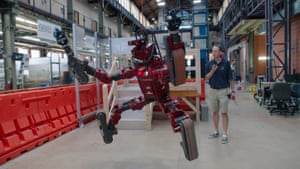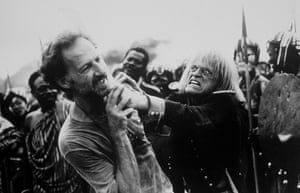Werner Herzog: 'My fake selves have some unifying sensory organ'
Xan Brooks
T
he man sitting opposite could be a pugnacious newcomer pitching for a job. He lays out his credentials just in case I don’t know and recounts scenes from his films which I already know off by heart. He claims he performs a magic with cinema which no one else can. They should put him in a straitjacket, his work is that wild. Building to a climax, he says: “I want to throw my arm around your shoulder and take you to the realm of complete poetry and fantasy.” I think he’s speaking metaphorically. Then again, maybe not.
It’s tempting to cast Werner Herzog as the last of cinema’s old-style swashbucklers; the sort of intrepid adventurer who makes movies in the way other men might go prospecting for gold or sail off in search of the Northwest Passage. It’s a view the man himself does little to discourage. Pour him some coffee and he’ll pour out his war stories. He’ll mention (surely for the umpteenth time) how he once hauled a steamship over a mountain in Peru (for 1982’s Fitzcarraldo). Or how he hypnotised his entire cast (1976’s Heart of Glass). Or how he’s supposedly the only film-maker to have shot on all seven continents. He’d be utterly exasperating if he weren’t so entertaining, if his films weren’t so good, and if all his tall tales were not by and large true.
His latest documentary, Lo and Behold, Reveries of the Connected World, sends Herzog travelling to the lawless frontier of the virtual world. He comes cantering through the badlands of online forums, robot laboratories and hacker conventions, firing questions as he goes. The trip is typically idiosyncratic, brazenly subjective. Out of the blue, for instance, the director spins an exuberant fantasy of a futuristic Chicago that is completely abandoned except for a few Buddhist monks. On another occasion, wandering the campus at UCLA, he can’t resist providing a review of the decor: “The corridors here look repulsive.”
I would be cautious about assigning qualities like good or bad to the internet. We don’t do it with electricity, do we?
Off camera, too, the man has an authoritative snap that verges on the comic. He’s as capricious as a medieval king. His precise German accent lends every pronouncement an Old Testament thunder. His sentences swing from chuckling amusement to inexplicable fury. I have the sense he’s at his happiest when his thoughts have free rein. He can’t be doing with interruptions or pesky attempts to pin him like a butterfly. “Your premise is partially true,” he tells me at one point, “and fundamentally wrong.”
Herzog insists he has nothing against the internet, per se. It’s just that it is currently experiencing a boom time, “like American cars in Elvis time”, and that we need to learn how to use it responsibly. One woman in his film – a bereaved mother who experienced horrific online abuse – regards social media as the embodiment of all evil. Herzog sympathises with her but doesn’t see it that way. “I would be cautious about assigning qualities like good or bad to the internet. We don’t do it with electricity, do we?”
In the past, Herzog’s movies have taken him up the Amazon river (Aguirre, Wrath of God), across the Antarctic (Encounters at the End of the World) and through the bear-infested woods of Alaska (Grizzly Man). I’ve just watched his other new documentary, the excellent Into the Inferno, in which he hunkers down at the edge of a belching volcano. Time and again, his work depicts a natural world which is beautiful and terrible and ultimately uncaring. I wonder if the virtual world is really any different.
Herzog frowns at the notion. “No,” he says. “Because it is not independent of us. When we speak of the horrors of the internet, it’s not the internet we are talking about – it’s humans. And human nature manifests itself in a way we have never seen before, because it’s anonymous and it’s on a massive scale. But it is not like nature, that is not it at all. It is human beings using the tool of the internet.”
The director turned 74 in September. He accepts that this makes him a stranger in a strange land. He’d rather speak face-to-face than pick up a smartphone. He’d rather walk to the shop as opposed to using satnav. But he admits that technology has its uses. Herzog is based in LA and so he will often email his brother, who lives in Vienna. Alternatively he might use Google for what he refers to as “superficial research”. Just the other day he was looking up neolithic menhirs in Brittany; sending pictures to a friend. He says: “The menhirs break into very interesting shapes.”
And yet while Herzog may be keen to hold the internet at arm’s length, the internet – for its part – rushes to embrace him. His distinctive persona has inspired a rash of Twitter handles and Facebook profiles and a chatbot that advises the user to immediately read a book called The Catalogue of Dwarves by the Poetic Edda.
“Yes,” he says. “I have a presence on the internet – one that I have not encouraged. It’s fake. Somebody answers. There are voice impersonators. So I have had to get acquainted with this very quickly. Representation of self is drastically changing. And of course on Facebook it’s all embellished, stylised selves anyway. But my popularity on the internet has to do with the fact that all of these fake selves somehow recognise each other and have some unifying sensory organ for authenticity.” He chuckles. “So I have no problem with all the impostors. It would be silly to complain. I think I have enough self-irony to understand what’s going on.”
I suggest that in his later years he has become a kind of self-sustaining brand: the archetypal European arthouse director. Most of the people who follow his representatives online have probably never actually sat through one of his films. “No,” he says. “Not true. People actually see my films more now. I get emails from 12 year olds asking about The Enigma of Kaspar Hauser.”
Shot back in 1974, The Enigma of Kaspar Hauser is the haunting, fact-based tale of a young outcast, raised in chained isolation before being adopted by 19th-century bourgeois society. Possibly it even reflects Herzog’s own experience. He spent his childhood in the German Alps, without a telephone or running water. Alighting in Munich as an adolescent, he stole his first camera from the local film school. Even today, he seems to pride himself on a primitive purity, a naked curiosity about the world and its people. It’s as if he believes that each production he shoots is the very first film ever made.
He agrees that this mindset is a hangover from his youth. “I had no experience of cinema until I was 11. I didn’t even know cinema existed because I grew up in the mountains of Bavaria, very remote. So I always, from a very young age, had the feeling I had to invent cinema. Even today I feel like the inventor of cinema. Now you have to take that with a grain of salt, because of course I’m not the inventor of cinema. But nonetheless…” He trails off.
I ask what the catalyst was; what initially made him want to direct. He says he honestly can’t think; most likely the profession chose him. “I love what I do. And I have never been able to learn anything else. A decent profession. The only thing I also wanted to be was an athlete. I wanted to be a ski-jumper. But that was over in a second when my best friend at the time had a near-fatal accident.”
Does he still ski for pleasure? “No,” he says. “Because I had a very serious accident of my own some years ago. And the injuries I suffered are somehow still present.” For some reason this strikes him as funny; he can’t stop giggling. “I shouldn’t fall hard on my left shoulder, for example. I would come apart at the seams. You watch. I would explode!”The evidence suggests that he’s exploded already. As well as the two documentaries currently doing the rounds, he has an ecological thriller (Salt and Fire) set for imminent release. His workrate, if anything, appears to be speeding up. And that’s reckoning without his vibrant online presence: the Twitterbots and avatars which speak their master’s voice to the world.
“I am becoming, like, an internet meme!” Herzog exclaims at one point and his amusement is such that it makes him choke on his coffee. He’s like a student mastering an exotic language, or a child taking his first steps in a brand new pair of shoes.







No comments:
Post a Comment